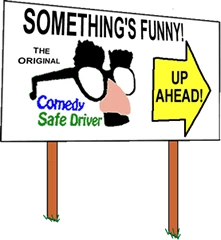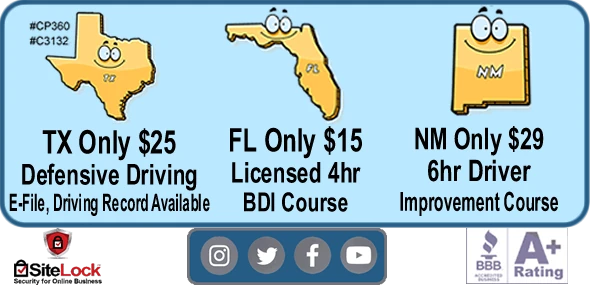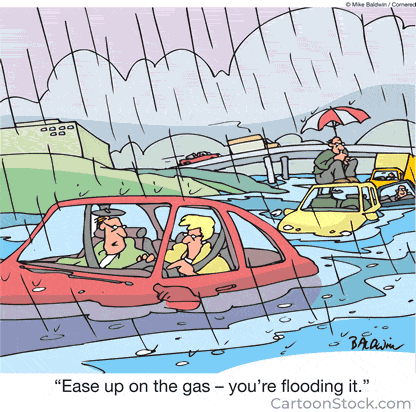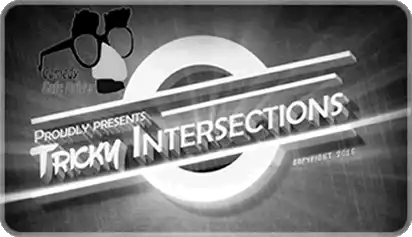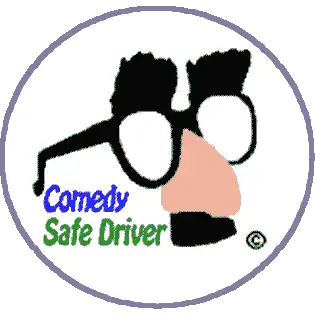Welcome to Comedy Safe Driver: The Best Physical Comedy Class for Defensive Driving

Texas Department of Public Safety website has a lot to say about ‘Drowsy Driving:’
Falling asleep at the wheel is known as the “silent killer” because it is underreported as the cause of fatal traffic crashes. There is no accurate test to determine the level of sleepiness like there is to determine intoxication and there is little or no police training in identifying drowsiness crash factors.
In Texas, a reported 256 drivers were involved in fatal wrecks in which fatigue or falling asleep at the wheel was the cause of the crash. Another 4,558 drivers were involved in injury wrecks and a total of 7,711 drivers were involved in property damage wrecks in which they were fatigued or asleep. (2001 DPS Motor Vehicle Traffic Accident Report)
Drowsy Driving - Physical Comedy Class
Learning defensive driving doesn't have to be boring. With our Physical Comedy Class, we make safety both engaging and entertaining. Sign up now for a unique, hilarious experience.
Why Choose Our Physical Comedy Class?
Physical comedy is a unique form of performing art, often used in theater, movies, and television shows, that relies on physical movement, actions, and expressions rather than verbal humor. It can be a useful skill for anyone interested in performance arts, acting, or simply breaking the ice in social situations. Here are a few reasons why you might want to consider our Physical Comedy Class:
-
Improves Physical Awareness and Control: Physical comedy demands a heightened sense of body awareness and control. You'll learn how to utilize your body to generate humor, something that can be useful not only on stage but in everyday life as well.
-
Enhances Creativity: This class will push you to think outside the box and use your creativity in new and exciting ways. You'll have to develop original skits, scenes, or routines that convey humor through physicality.
-
Develops Timing Skills: In physical comedy, timing is everything. You'll learn how to gauge your audience and deliver your actions at just the right moment to generate the most laughter.
-
Boosts Confidence: Performing in front of others can significantly boost your self-confidence. As you grow comfortable making others laugh, you'll also become more comfortable in your skin.
-
Provides Fun and Fitness: Physical comedy can be an enjoyable way to stay fit. Many of the techniques you'll learn involve physical exertion, providing an unconventional workout.
-
Offers a Supportive Environment: Our instructors are experienced and patient, offering a safe, inclusive environment where students can learn, make mistakes, and grow. They're dedicated to helping each student discover and hone their unique comedic style.
-
Encourages Teamwork: Physical comedy often involves working in pairs or groups, fostering a sense of camaraderie, and teaching the importance of teamwork.
Whether you aspire to be a professional actor or simply want to enhance your interpersonal skills, our physical comedy class has something to offer. And most importantly, you'll have a great deal of fun in the process!
The Impact of Drowsy Driving: Insights from the TX Department of Public Safety
The impact of drowsy driving is more significant than many people realize. It poses a severe risk to road safety, often with catastrophic results. Here are some insights from the TX Department of Public Safety:
-
Increased Risk of Accidents: Fatigue poses a significant risk to road safety as it can lead to increased accidents and dangerous driving situations. When a person is fatigued, their physical and mental abilities are compromised, affecting their overall performance behind the wheel. Here are some elaborations on how fatigue contributes to an increased risk of accidents:
-
Slowed reaction time: Fatigue slows down a driver's reaction time, making it more difficult for them to respond promptly to unexpected situations on the road. This delay in reaction time can be crucial in avoiding accidents, such as sudden braking or swerving to avoid obstacles.
-
Decreased awareness: Fatigue reduces a driver's overall awareness of their surroundings. They may become less attentive to important cues and signals on the road, such as traffic signs, pedestrians, or other vehicles. This decreased awareness can lead to missed information or delayed responses, increasing the likelihood of accidents.
-
Impaired judgment: When fatigued, drivers may experience impaired judgment and decision-making abilities. They may have difficulty accurately assessing risks and making appropriate choices while driving. This impairment can result in poor judgments, such as misjudging the speed or distance of other vehicles, leading to potentially dangerous situations.
-
Difficulty making quick decisions: Fatigue can hinder a driver's ability to make quick decisions on the road. In critical situations that require immediate action, such as sudden lane changes or evasive maneuvers, drowsy drivers may struggle to respond effectively. This delay in decision-making can increase the chances of collisions or accidents.
-
Failure to notice changing traffic conditions: Fatigue can cause drivers to become less observant of changing traffic conditions. They may fail to notice important details, such as slowing or stopping vehicles, merging traffic, or changing road conditions. This lack of awareness can result in rear-end collisions, sideswipes, or other accidents due to an inability to adapt to the changing environment.
It's important to recognize the dangers associated with driving while fatigued. To mitigate the risk of accidents caused by fatigue, drivers should prioritize getting sufficient sleep, take regular breaks during long journeys, and avoid driving when feeling excessively tired. Additionally, implementing legislation and awareness campaigns about the dangers of drowsy driving can help promote safer driving practices and reduce the incidence of fatigue-related accidents on the road.
-
-
Similarity to Drunk Driving: The effects of sleep deprivation can be likened to those of alcohol consumption, particularly in relation to impaired driving. Research has shown that the impact of sleep deprivation on cognitive and physical abilities can be similar to the effects of alcohol intoxication. Here are some elaborations on the similarity between sleep deprivation and drunk driving:
-
Impaired cognitive functions: Both sleep deprivation and alcohol consumption can impair cognitive functions necessary for safe driving. Lack of sleep affects attention, concentration, memory, and decision-making abilities, just like alcohol does. This impairment can result in delayed reactions, decreased situational awareness, and poor judgment on the road.
-
Slowed reaction time: Both sleep deprivation and alcohol consumption can significantly slow down a driver's reaction time. Fatigue affects the brain's processing speed, making it harder for a driver to respond quickly to unexpected events or hazards. Similarly, alcohol affects the central nervous system, leading to delayed reaction times, which can hinder a driver's ability to avoid accidents.
-
Decreased coordination and motor skills: Sleep deprivation and alcohol consumption can both impair coordination and motor skills required for safe driving. Fatigue can cause muscle weakness, slower reflexes, and reduced hand-eye coordination, making it difficult to steer, brake, or maneuver the vehicle effectively. Alcohol affects motor control and coordination in a similar manner, increasing the risk of accidents due to poor control over the vehicle.
-
Impaired judgment and decision-making: Both sleep deprivation and alcohol consumption can impair judgment and decision-making abilities. Fatigue can lead to impaired reasoning and reduced ability to assess risks accurately. Similarly, alcohol affects the brain's ability to make sound decisions, leading to risky behaviors on the road.
-
Increased accident risk: The combination of impaired cognitive functions, slowed reaction time, decreased coordination, and impaired judgment significantly increases the risk of accidents. Fatigued drivers and intoxicated drivers are both more prone to making errors, such as failing to recognize hazards, misjudging distances, or making incorrect lane changes, which can result in collisions or other types of accidents.
Considering the similarities between sleep deprivation and drunk driving, it becomes evident that drowsy driving can be as dangerous as driving under the influence of alcohol. To ensure road safety, it is crucial to prioritize sufficient sleep, avoid driving while fatigued, and encourage responsible decision-making regarding sleep and alcohol consumption. Public awareness campaigns and education about the risks of drowsy driving can help highlight the importance of treating fatigue with the same seriousness as alcohol impairment when it comes to road safety.
-
-
Microsleep Episodes: Drowsy drivers often experience "microsleep" - brief moments of sleep or near-sleep that can last a few seconds. During these episodes, a vehicle can travel a considerable distance without the driver's control or awareness.
-
Higher Fatalities: Fatigue-related crashes are more likely to result in fatalities or severe injuries because drowsy drivers often do not take evasive actions prior to the crash. They may not brake or steer away from the impending collision due to impaired response time.
-
Overrepresentation in Night-time and Long-Distance Accidents: Drowsy driving accidents are particularly overrepresented during night hours and on long highway routes when drivers are more likely to be fatigued.
-
Underreporting of Incidents: Drowsy driving is believed to be significantly underreported as a cause of crashes due to the difficulty in detecting fatigue as a crash factor. Unless a driver admits to falling asleep, fatigue often goes unreported or unrecognized.
Given these alarming insights, it is clear that combating drowsy driving should be a priority. This can include educational programs about the risks of sleep-deprived driving, promoting healthy sleep habits, understanding the signs of drowsiness, and knowing when to pull over for rest. Furthermore, the development and implementation of fatigue detection technology in vehicles can also play a key role in preventing drowsy driving.
Our unique Physical Comedy Class tackles these issues head-on, teaching you essential skills to stay alert, focused, and most importantly, safe on the road - all while ensuring a hearty laugh!

